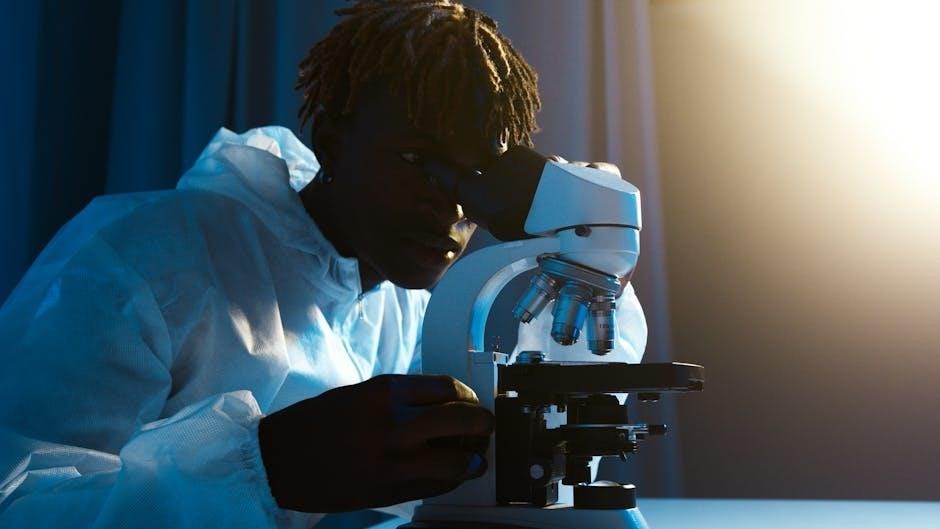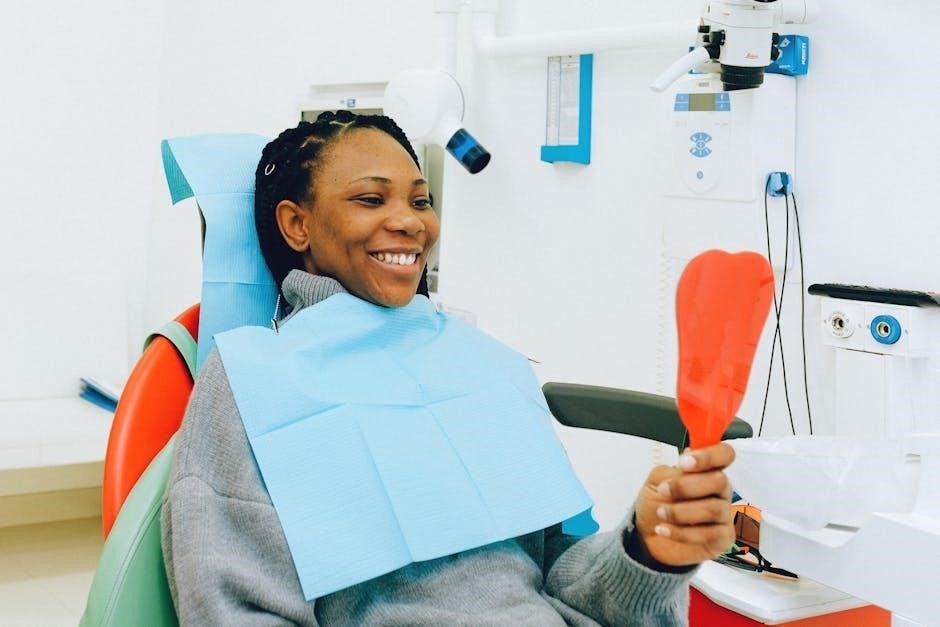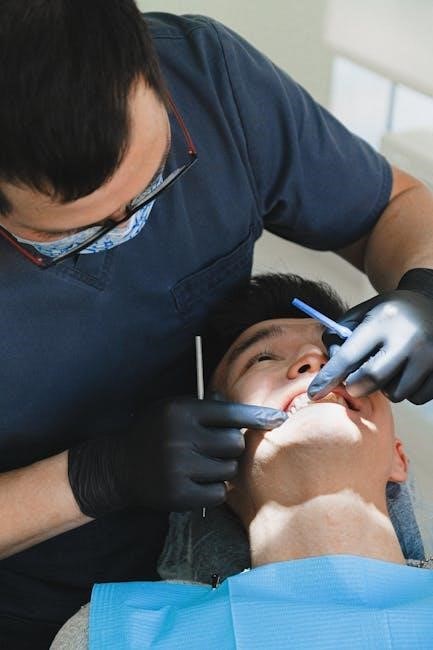Patient Care Technicians (PCTs) are essential healthcare professionals who assist with daily patient care tasks‚ monitor conditions‚ and maintain accurate records. They play a vital role in supporting nurses and doctors‚ ensuring high-quality patient support in various healthcare settings.
Overview of the Role
Patient Care Technicians (PCTs) are healthcare professionals who provide direct patient care under the supervision of nurses and doctors. Their role involves assisting with daily living activities‚ monitoring vital signs‚ and performing basic medical procedures. PCTs work in hospitals‚ clinics‚ and long-term care facilities‚ ensuring patients receive compassionate and efficient care. They are responsible for maintaining patient records‚ preparing medical equipment‚ and supporting healthcare teams in delivering high-quality services. The role requires strong communication skills‚ attention to detail‚ and the ability to work in fast-paced environments. PCTs play a critical role in ensuring patient safety‚ comfort‚ and overall well-being‚ making them indispensable in modern healthcare settings.
Importance in Healthcare
Patient Care Technicians (PCTs) are vital to the healthcare system‚ providing essential support that ensures patients receive high-quality care. By assisting with daily tasks‚ monitoring patient conditions‚ and maintaining accurate records‚ PCTs enable nurses and doctors to focus on complex medical decisions. Their role is crucial in improving patient outcomes‚ enhancing safety‚ and promoting overall satisfaction. PCTs also play a key part in infection control‚ safety protocols‚ and emergency responses‚ making them indispensable in maintaining efficient healthcare operations. Their hands-on contributions directly impact patient well-being‚ making them a cornerstone of modern healthcare teams.
Key Responsibilities of Patient Care Technicians
Patient Care Technicians assist nurses and doctors with daily tasks‚ monitor patients‚ handle medical equipment‚ and prepare patients for exams‚ ensuring efficient support in healthcare settings.
Daily Tasks and Duties
Patient Care Technicians perform a variety of essential tasks to support patient well-being and healthcare operations. Their daily duties include assisting patients with mobility‚ managing catheters‚ preparing treatment rooms‚ and maintaining a clean environment. They also help patients with feeding‚ grooming‚ and other personal care needs. Monitoring patients’ behavior and physical condition‚ such as observing for signs of distress or discomfort‚ is another critical responsibility. Additionally‚ PCTs may assist with laboratory tests‚ collect specimens‚ and prepare patients for medical procedures. Effective communication with patients and families is key‚ as they often serve as a primary point of contact. By addressing these diverse tasks‚ PCTs ensure smooth healthcare delivery and improve patient outcomes.
Interacting with Patients and Families
Patient Care Technicians (PCTs) must excel in communication to effectively interact with patients and their families. They provide emotional support‚ address concerns‚ and explain care procedures to ensure understanding and comfort. Active listening and empathy are crucial in building trust. PCTs also act as liaisons between patients and healthcare providers‚ relaying important information. They must adapt communication styles to meet diverse patient needs‚ including cultural and language differences. Additionally‚ PCTs often assist families with navigating the healthcare system‚ offering guidance and reassurance. By fostering a supportive and respectful environment‚ PCTs play a key role in improving patient satisfaction and overall care outcomes.
- Provide emotional support and reassurance.
- Communicate clearly and adapt to patient needs.
- Act as a liaison between patients and healthcare teams.
- Respect cultural and language differences.

Education and Training Requirements
Patient Care Technicians typically require formal training through vocational programs or community colleges. These programs cover clinical skills‚ patient care‚ and essential medical knowledge‚ preparing them for certification and practice.
Recommended Training Programs
Patient Care Technician training programs are typically offered through vocational schools‚ community colleges‚ or medical institutes. These programs usually last several months to a year and combine classroom instruction with clinical training. Coursework often includes topics like patient care skills‚ medical terminology‚ anatomy‚ and infection control. Many programs are accredited by recognized organizations‚ ensuring they meet industry standards. Some programs also offer specializations‚ such as geriatric or pediatric care. Clinical externships provide hands-on experience in healthcare settings. Additionally‚ online courses and hybrid programs offer flexibility for those balancing other responsibilities. Graduates are prepared to take certification exams‚ such as those for Certified Nursing Assistant (CNA) or Certified EKG Technician. These programs are essential for gaining the skills and knowledge needed to succeed in this role.
Certification Options
Certification options for Patient Care Technicians enhance career prospects and demonstrate expertise. Common certifications include Certified Nursing Assistant (CNA)‚ Certified Patient Care Technician (CPCT)‚ and Certified EKG Technician (CET). These credentials validate skills in patient care‚ vital sign measurement‚ and medical procedures. Certification typically requires passing an exam‚ often after completing a training program. Some certifications focus on specific areas‚ such as geriatric care or phlebotomy. Maintaining certification may involve continuing education or periodic renewal. Employers often prefer certified candidates‚ as it ensures a standardized level of competency. Certifications also allow professionals to specialize‚ increasing their versatility in healthcare settings and advancing their career opportunities.

Clinical Skills for Patient Care
Clinical skills for patient care include monitoring techniques‚ vital sign measurement‚ and operating medical equipment. These skills are crucial for accurate assessments and ensuring patient safety and comfort.
Patient Monitoring Techniques
Patient monitoring techniques involve observing and recording patients’ vital signs‚ such as heart rate‚ blood pressure‚ and oxygen levels‚ to ensure their well-being. These methods often include the use of electronic health records (EHRs) to document findings accurately. Monitoring may also involve tracking physical changes‚ like skin condition or mobility‚ to detect early signs of complications. Proper use of medical devices‚ such as pulse oximeters and blood pressure monitors‚ is essential for precise measurements. Additionally‚ PCTs must maintain clear and detailed records to inform healthcare teams about patient status. Effective monitoring ensures timely interventions and supports personalized care plans‚ ultimately improving patient outcomes and safety.
Measuring Vital Signs
Measuring vital signs is a fundamental skill for Patient Care Technicians‚ involving the assessment of key physiological indicators such as temperature‚ pulse‚ respiration rate‚ blood pressure‚ and oxygen saturation. Accurate measurement ensures timely detection of abnormalities and informs clinical decisions. Temperature is typically measured using oral or digital thermometers‚ while pulse and respiration rates are assessed manually or with electronic devices. Blood pressure is measured using a sphygmomanometer‚ and oxygen saturation is monitored with a pulse oximeter. Proper technique is essential to ensure reliability. Vital signs are recorded regularly and compared to baseline values to track patient progress. This data is critical for identifying trends and supporting personalized care plans‚ making it a cornerstone of effective patient care.
Communication Skills in Healthcare
Effective communication is crucial in healthcare‚ ensuring clear and empathetic interactions between patients‚ families‚ and healthcare teams. Active listening‚ clarity‚ and avoiding medical jargon build trust and understanding.
Effective Patient Communication
Effective patient communication involves clear‚ empathetic‚ and patient-centered interactions. Patient care technicians must listen actively‚ use simple language‚ and avoid medical jargon to ensure understanding. Maintaining eye contact‚ displaying empathy‚ and validating patients’ feelings foster trust and comfort. Clarity is key; technicians should confirm patients’ comprehension and address any concerns promptly. Cultural sensitivity and adaptability in communication styles are also vital to meet diverse patient needs. Documentation of discussions ensures continuity of care. By focusing on these strategies‚ PCTs can enhance patient satisfaction‚ improve outcomes‚ and build strong therapeutic relationships.
Collaboration with Healthcare Teams
Collaboration with healthcare teams is a cornerstone of effective patient care. Patient care technicians work closely with nurses‚ doctors‚ and other healthcare professionals to ensure comprehensive care. Clear communication‚ mutual respect‚ and understanding of each team member’s role are essential. PCTs contribute by sharing patient observations‚ assisting with procedures‚ and maintaining accurate records. Active participation in team meetings and care planning helps streamline workflows and improve patient outcomes. By fostering a collaborative environment‚ PCTs enhance teamwork‚ reduce errors‚ and promote a patient-centered approach. Effective teamwork not only benefits patients but also supports the overall efficiency of healthcare operations.

Legal and Ethical Considerations
Legal and ethical considerations are crucial in patient care‚ ensuring confidentiality‚ privacy‚ and adherence to HIPAA guidelines. PCTs must uphold ethical standards‚ respect patient rights‚ and follow healthcare policies and laws to provide care responsibly and compassionately.
Patient Confidentiality and HIPAA
Patient confidentiality and HIPAA compliance are fundamental for Patient Care Technicians (PCTs). HIPAA (Health Insurance Portability and Accountability Act) ensures the protection of patients’ medical information. PCTs must safeguard patient data‚ including medical records and personal details‚ from unauthorized access. This involves securely storing records‚ using encrypted digital systems‚ and only sharing information with authorized personnel. Breaching confidentiality can lead to legal consequences and damage to patient trust. PCTs are trained to adhere to these regulations‚ ensuring that patient privacy is maintained at all times. Understanding and upholding HIPAA guidelines is essential for providing ethical and lawful patient care.
Medical Ethics in Patient Care
Medical ethics are core principles guiding Patient Care Technicians (PCTs) in delivering compassionate and respectful care. Key ethical principles include respect for autonomy‚ beneficence‚ non-maleficence‚ and justice. PCTs must ensure patients’ rights‚ such as informed consent and confidentiality‚ are upheld. Ethical dilemmas may arise in end-of-life care or cultural differences‚ requiring PCTs to balance patient preferences with medical guidelines. Maintaining professional boundaries and treating all patients with dignity‚ regardless of background‚ is essential. Adhering to ethical standards fosters trust and ensures patient-centered care. PCTs must stay informed about ethical practices and seek guidance when faced with challenging situations to provide care that aligns with both legal and moral obligations.

Technology in Patient Care
Technology plays a crucial role in modern patient care‚ with tools like Electronic Health Records (EHRs)‚ telehealth platforms‚ and advanced medical devices enhancing efficiency and accuracy. These innovations improve patient outcomes by streamlining documentation‚ enabling remote monitoring‚ and facilitating better communication between healthcare providers.
Electronic Health Records (EHRs)
Electronic Health Records (EHRs) are digital versions of patient charts‚ streamlining communication and care coordination among healthcare providers. They store patient histories‚ diagnoses‚ medications‚ and treatment plans in a secure‚ accessible format. EHRs improve care accuracy by reducing errors and enhancing patient safety. Patient care technicians often assist in maintaining these records‚ ensuring data is up-to-date and accurate. EHR systems also enable real-time access to patient information‚ facilitating better decision-making and continuity of care. Additionally‚ they support telehealth services and integrate with other medical devices‚ making them a cornerstone of modern healthcare technology. Proper training in EHR management is essential for patient care technicians to optimize their role in patient care delivery.
Medical Devices and Equipment
Medical devices and equipment are crucial tools in healthcare‚ enabling patient care technicians to monitor‚ diagnose‚ and treat patients effectively. Common devices include vital sign monitors‚ EKG machines‚ ventilators‚ and portable defibrillators. These tools help technicians gather accurate data‚ such as heart rate‚ blood pressure‚ and oxygen levels‚ ensuring timely interventions. Advances in technology‚ like IoT-integrated devices‚ improve monitoring and data collection. Patient care technicians must be trained to operate and maintain this equipment properly‚ ensuring patient safety and accurate readings. Familiarity with medical devices is essential for providing high-quality care and supporting healthcare teams in diverse clinical settings.

Safety Protocols and Infection Control
Safety protocols and infection control are critical in healthcare settings‚ ensuring patient and staff safety. Key practices include hand hygiene‚ proper use of PPE‚ and sterilization techniques to prevent infections and maintain a safe environment.
Standard Precautions
Standard precautions are essential infection control practices applied to all patients‚ regardless of their condition. They include hand hygiene‚ use of personal protective equipment (PPE) like gloves and masks‚ safe handling of sharps‚ and proper cleaning of equipment. These measures prevent the transmission of infectious agents and protect both patients and healthcare workers. Training in standard precautions is mandatory for patient care technicians to ensure a safe environment and minimize risks. Adherence to these protocols is critical in maintaining high standards of patient care and reducing the spread of infections in healthcare settings.
Emergency Procedures
Emergency procedures are critical protocols that patient care technicians must master to respond effectively in high-stress situations. These include cardiopulmonary resuscitation (CPR)‚ use of automated external defibrillators (AEDs)‚ and management of choking or bleeding incidents. PCTs must also know how to handle medical emergencies like seizures or allergic reactions. Proper use of emergency equipment‚ such as crash carts‚ is essential. Additionally‚ PCTs should be trained in fire safety‚ evacuation procedures‚ and how to activate emergency response systems. Staying calm and following established protocols ensures patient safety and efficient care during crises. Regular training and drills are necessary to maintain proficiency in these life-saving skills.

Soft Skills for Success
Soft skills‚ such as communication‚ empathy‚ and cultural competence‚ are crucial for patient care technicians to build trust and provide compassionate care. These skills enhance patient interactions and teamwork.
Emotional Resilience
Emotional resilience is critical for patient care technicians to manage the stress and emotional demands of healthcare roles. It enables them to maintain composure during challenging situations‚ such as handling critically ill patients or dealing with difficult family members. Developing resilience involves self-care practices‚ stress management techniques‚ and fostering a growth mindset. Empathy and compassion‚ while essential‚ must be balanced with professional boundaries to prevent burnout. Resilient PCTs can adapt to high-pressure environments‚ provide consistent care‚ and support their teams effectively. Cultivating emotional resilience not only enhances job performance but also contributes to overall well-being and job satisfaction in the demanding healthcare field.
Cultural Competence
Cultural competence is essential for patient care technicians to deliver effective‚ patient-centered care in diverse healthcare settings. It involves understanding and respecting patients’ cultural beliefs‚ values‚ and practices‚ which can significantly influence their health behaviors and treatment preferences. PCTs must recognize how cultural differences may impact communication‚ decision-making‚ and adherence to care plans. For example‚ language barriers or religious practices may require tailored approaches. Developing cultural competence enhances trust and satisfaction‚ ensuring care is sensitive to individual needs. It also fosters collaboration among healthcare teams and promotes equitable outcomes. By embracing cultural diversity‚ PCTs can provide more inclusive and compassionate care‚ addressing the unique needs of all patients.
Career Advancement Opportunities
Patient Care Technicians can advance their careers by obtaining specialized certifications or pursuing higher education‚ leading to roles like licensed practical nurses or medical assistants.
Specializations in Patient Care
Patient care technicians can specialize in various fields to enhance their expertise and career opportunities. Areas of specialization include gerontology‚ focusing on elderly care‚ dialysis for renal patients‚ and surgical or operating room settings. Specializing in rehabilitation or pediatric care is also possible‚ allowing technicians to work with specific patient populations. Additionally‚ some PCTs pursue certifications in phlebotomy or electrocardiography (EKG) to broaden their skill sets. These specializations not only increase job prospects but also enable technicians to provide more tailored‚ compassionate care to diverse patient needs.
Professional Development
Professional development is crucial for patient care technicians to advance their careers and deliver high-quality care. Pursuing certifications‚ attending workshops‚ and participating in continuing education programs can enhance skills and knowledge. Staying updated on healthcare advancements and technological innovations is essential. Joining professional organizations provides networking opportunities and access to resources. Many PCTs also pursue specialized certifications‚ such as Certified Nursing Assistant (CNA) or Medical Assistant (MA)‚ to broaden their career options. Employers often support professional growth through tuition reimbursement or on-the-job training. Investing in continuous learning ensures patient care technicians remain competent and adaptable in a rapidly evolving healthcare environment‚ opening doors to leadership roles or advanced positions.

Resources for Further Learning
Online courses‚ recommended study guides‚ and professional communities offer valuable resources for patient care technicians to deepen their knowledge and skills. These resources support continuous learning and career growth.
Recommended Study Materials
Textbooks‚ online courses‚ and interactive guides are essential for mastering patient care techniques. Key resources include textbooks like “Patient Care Technician Manual” and “Medical Assisting”. Online platforms such as Coursera and Udemy offer comprehensive courses. Additionally‚ flashcard apps like Anki and Quizlet provide quick review options. Study guides from professional organizations‚ such as the National Healthcareer Association (NHA)‚ offer exam prep materials. Interactive simulations and videos on YouTube and SkillsLab further enhance practical understanding. These resources cover clinical skills‚ patient communication‚ and legal considerations‚ ensuring a well-rounded education for aspiring patient care technicians. Utilizing these tools helps build confidence and competence in the field.
Online Courses and Tutorials
Online courses and tutorials provide flexible and accessible learning opportunities for aspiring patient care technicians. Platforms like Coursera‚ Udemy‚ and SkillsLab offer comprehensive programs that cover essential skills such as patient monitoring‚ vital sign measurement‚ and infection control. Many courses include interactive simulations‚ quizzes‚ and real-world case studies to enhance learning. For example‚ “Essentials of Patient Care” on Udemy and “Clinical Skills for PCTs” on Coursera are highly recommended. These resources often include video lectures‚ downloadable materials‚ and discussion forums for peer interaction. Additionally‚ specialized tutorials on YouTube and professional websites focus on specific topics like EHR management and medical ethics. These online tools are ideal for self-paced learning and skill mastery‚ ensuring students are well-prepared for certification exams and real-world challenges.
Patient care technicians play a crucial role in delivering high-quality‚ compassionate care in healthcare settings. This guide has covered essential skills‚ from clinical techniques to communication strategies‚ providing a comprehensive foundation for success. Continuous learning and adaptation to new technologies and ethical standards are vital in this evolving field. Whether you’re a new technician or an experienced professional seeking to expand your expertise‚ this guide serves as a valuable resource. By applying the knowledge and skills outlined here‚ you can contribute effectively to patient well-being and thrive in your career as a patient care technician.
